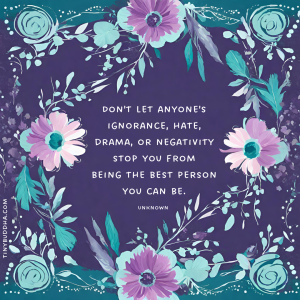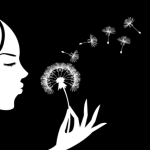
“The way you treat yourself sets the standard for others.” ~Sonya Friedman
The longer I stayed on the phone, the more agitated I became. My mother was on the other end, as usual, dumping her emotions on me. I had moved to Los Angeles for graduate school in part to escape all of this—my mother’s unhappiness, my sense of responsibility, the pressure to be perfect.
When I hung up the phone, I felt an overwhelming sense of anger. At the time, I could not (correction: would not) allow myself to admit that I was angry with my mother. I couldn’t reconcile having such negative feelings and loving my mother at the same time.
After all, hadn’t she sacrificed so much for me? Hadn’t I always considered her to be my closest confidante? Didn’t I proudly declare her to be my best friend when I was younger?
Even the most positive memories between my mother and me have been eclipsed by the shadow of her depression.
As a young child, I could never understand why my mommy was so sad all the time. I cherished the rare days she was carefree and silly and held these moments close to my heart. When she slipped into a depressive state, sleeping days at a time in her dark room, I willed her to come out.
Early on, I learned to temper my behavior and my own emotions so as not to instigate or prolong her sadness. In my young mind, I made myself responsible for her and was not able to separate her feelings from mine.
I wanted her to be happy and thought that if I was always “good,” she would be. When she wasn’t happy, I blamed myself.
Unconsciously, my mother fed this belief when she constantly bragged to others that I was the “perfect daughter.” The pressure to live up to my mother’s expectations overwhelmed me. I suppressed a lot of negative feelings and experiences in favor of upholding the ideal she and I had co-created.
That day, I turned this anger toward a safer target, my co-worker. That day at work, I blew up. I can’t remember what I said, but I distinctly remember the look of confusion on her face. My frustration with my inability to express myself made me even angrier. I excused myself, ran to the bathroom, locked myself in the last stall, and bawled my eyes out.
Soon after, I took advantage of the free counseling services on campus. Over the next several weeks, my counselor helped me realize that it was okay to feel the way I was feeling. This was a radical idea for me, and one I struggled with at first.
Because I had suppressed my own feelings for so long, when I finally allowed them to surface, they were explosive.
Anger, resentment, and disgust came alive and pulsed through my body whenever I spoke with my mother during this time. While she seemed to accept truth and honesty from other people, I tiptoed around certain topics for fear of upsetting her.
I never felt I could share the difficulties and challenges I experienced in my own life because this contradicted who I was to her. I felt I had no right to be unhappy. When I attempted to open up about these things, she often interrupted me with a story of her own suffering, invalidating the pain I felt.
She seemed committed to being the ultimate victim and I resented her for what I perceived as weakness.
I realized that to get through my graduate program with my sanity intact, I needed to limit the amount of time and energy I gave to her. Instead, I found ways to protect and restore my energy. Writing became therapeutic for me. I found I could say things in writing I was unable to verbalize to my mother.
This won’t be an easy letter for you to read and I apologize if it hurts you, but I feel like our relationship is falling apart, and one of the reasons is that I’ve kept a lot of this bottled up for so long. I never thought you could handle honesty from me, and so I lied and pretended everything was okay because I was always afraid I would “set you off” or that you would go into a depressed mood.
You unconsciously put so much pressure on other people (me especially) to fill your emptiness, but that’s a dangerous and unrealistic expectation and people can’t and won’t live up to it. And they start to resent you for it. I do want you to be happy, but I’m starting to realize that I can’t be responsible for your happiness and healing; only you can.
Seeing my truth on paper was the ultimate form of validation for me. I no longer needed to be “perfect.” I gave myself permission to be authentic and honored every feeling that came up.
When I was ready, I practiced establishing boundaries with my mother. I let her know that I loved and supported her, but it negatively affected me when she used our conversations as her own personal therapy sessions. I released the need to try to “fix” things for her.
I took care of me.
Do you have trouble establishing healthy emotional boundaries?
Take a moment to answer the following questions adapted from Charles Whitfield’s Boundaries and Relationships: Knowing, Protecting and Enjoying the Self.
Answer with “never,” “seldom,” “occasionally,” “often,” or “usually.”
- I feel as if my happiness depends on other people.
- I would rather attend to others than attend to myself.
- I spend my time and energy helping others so much that I neglect my own wants and needs.
- I tend to take on the moods of people close to me.
- I am overly sensitive to criticism.
- I tend to get “caught up” in other people’s problems.
- I feel responsible for other people’s feelings.
If you answered “often” or “usually” to the above statements, this might be an indication that you have trouble establishing healthy emotional boundaries.
Like me, you’re probably extremely affected by the emotions and energy of the people and spaces around you. At times, it can be incredibly hard to distinguish between your “stuff” and other people’s “stuff.”
It is incredibly important to establish clear emotional boundaries, or we can become so overwhelmed and overstimulated by what’s going around us that it’s sometimes hard to function.
Here are a few ways to begin the process of establishing healthier emotional boundaries.
1. Protect yourself from other people’s “stuff.”
I can feel when someone is violating a boundary because my body tenses up. I realize that my breathing is very shallow. I feel trapped, small, helpless.
The first thing I do is to remind myself to breathe. The act of focusing on my breath centers me and expands the energy around me. In this space, I can think and act more clearly.
When I feel myself becoming too overwhelmed, I try to immediately remove myself from the situation. Sometimes all it takes is a couple minutes to walk away and regain my balance. Other times, I have had to make the decision not to spend time with people who consistently drain my energy.
Having a safe space to retreat, practicing mindfulness and meditation, or visualizing a protective shield around yourself are other methods that can help restore balance when boundaries are invaded.
Find out what works best for you.
2. Learn to communicate your boundaries in a clear and consistent way.
For many, this can be the most difficult part of the process for various reasons. We don’t like to appear confrontational. We’re afraid that if we clear set boundaries for ourselves, the people in our lives will begin to resent us. However, learning to communicate boundaries effectively is necessary for healthy relationships.
I’m not comfortable with that.
It doesn’t feel good to…
I’m not okay with…
I appreciate if you wouldn’t…
Please don’t…
If you cringed at the thought of using any of these phrases, you’ll be relieved to know that communicating your boundaries doesn’t always have to be with words. You can also effectively communicate through the use of non-verbal.
Closing the door, taking a step back, shaking your head, or signaling with your hands can be less threatening ways of letting others know what you will and won’t accept from them.
3. Be patient with the process.
When I first realized that I was taking on the negative emotions of my mother, I became extremely resentful and disgusted with her. Instead of taking responsibility for my role in allowing this dynamic to occur, I blamed her for every negative thing that had happened in my life.
I closed myself off from her and shut her out completely. Our relationship became incredibly strained during this time as we both readjusted to the new boundaries I was setting.
Eventually, I was able to allow her to have her own emotional experience without making it about me. I could listen and no longer become enmeshed or feel obligated to do something about what she was feeling.
Whenever you change a pattern, it is natural to feel resistance from inside as well as outside the self. As you practice, your ego may start to act up and make you feel like you are “wrong” in establishing boundaries.
Others may also become resentful of your newfound assertiveness. They may be used to a certain dynamic in your relationship and any change has the potential to cause conflict.
Remember to be kind to yourself through the process and repeat the following affirmation:
I respect and love myself enough to recognize when something isn’t healthy for me, and I am confident enough to set clear boundaries to protect myself.
About Alana Mbanza
Alana Mbanza is a freelance writer and the author of LoveSick: Learning to Love and Let Go. Even more than a writer, she strives to be an active agent of creation, choosing to see and create life through the lens of love. Visit her website for more information about her freelance writing and coaching services.













 Though I run this site, it is not mine. It's ours. It's not about me. It's about us. Your stories and your wisdom are just as meaningful as mine.
Though I run this site, it is not mine. It's ours. It's not about me. It's about us. Your stories and your wisdom are just as meaningful as mine.